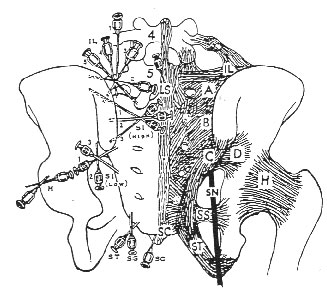◔
Sacroiliac Joint Prolotherapy: Difference between revisions
From WikiMSK
No edit summary |
No edit summary |
||
| Line 8: | Line 8: | ||
Kim et al (RCT): Intraarticular injections. 25% dextrose solution, done by diluting 50% dextrose in bupivicaine.{{#pmid:21138388|kim}} | Kim et al (RCT): Intraarticular injections. 25% dextrose solution, done by diluting 50% dextrose in bupivicaine.{{#pmid:21138388|kim}} | ||
Hoffman et al (Retrospective cohort): 15% dextrose in lidocaine.{{#pmid: | Hoffman et al (Retrospective cohort): 15% dextrose in lidocaine.{{#pmid:29609940|hoffman}} | ||
==Other== | ==Other== | ||
Revision as of 06:53, 29 July 2020
This article is a stub.
Protocols vary
Study Protocols
Cusi et al (RCT): Dorsal interosseous injection, done under CT guidance, for clinically diagnosed source of pain. 22-g spinal needle. 5mL syringe, 1.8mL of 50% dextrose, 2.3mL bupivicaine 1%, 0.8mL iopamidol contrast. 0.8mL injected into the ligament as it moves up and down the ligament. [1]
Kim et al (RCT): Intraarticular injections. 25% dextrose solution, done by diluting 50% dextrose in bupivicaine.[2]
Hoffman et al (Retrospective cohort): 15% dextrose in lidocaine.[3]
Other

Needle Location used for injection of the sacroiiac ligaments. Trigger point of ligaments: (IL) Iliolumbar; (LS) Lumbosacral-supra and interspinus; (A,B,C,D,) Posterior sacroiliac; (SS) Sacroapinus; (ST) Sacrotuberus;(SC) Sacrococcygeal;(H) Hip-Articular; (SN) Sciatic nerve (from G.S. Hackett, Ligament and Tendon Relaxation. Charles C. Thomas Co., 1958)
References
- ↑ Cusi et al.. The use of prolotherapy in the sacroiliac joint. British journal of sports medicine 2010. 44:100-4. PMID: 18400878. DOI.
- ↑ Kim et al.. A randomized controlled trial of intra-articular prolotherapy versus steroid injection for sacroiliac joint pain. Journal of alternative and complementary medicine (New York, N.Y.) 2010. 16:1285-90. PMID: 21138388. DOI.
- ↑ Hoffman & Agnish. Functional outcome from sacroiliac joint prolotherapy in patients with sacroiliac joint instability. Complementary therapies in medicine 2018. 37:64-68. PMID: 29609940. DOI.

